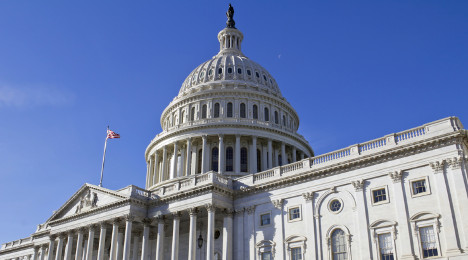Vehicle financing continued to be one of the more bandied about topics on Capitol Hill in recent days.
First, a member of the U.S. Senate introduced legislation to bring what the National Automobile Dealers Association called “transparency and accountability” to the Consumer Financial Protection Bureau's regulation of the auto finance market.
Then during a hearing lasting more than three hours, CFPB director Richard Corday asserted that Rep. Jeb Hensarling, chairman of the U.S. House Financial Services Committee had the matter “exactly backwards” when the two individuals clashed again over the agency’s investigation and $80 million enforcement action against Ally Financial more than two years ago.
During a six-minute exchange that can be seen in the video at the top of this page, Hensarling peppered Cordray about internal CFPB documents the committee used to generate multiple reports about how the bureau handled the investigation involving Ally. The Texas Republican also tried to use a review of salary figures of various CFPB staff members to question Cordray about the validity of disparate impact, a legal theory the bureau has used not only against Ally but other large players in the auto finance market.
At the outset of the hearing, Hensarling reiterated concerns about the depth of power held by the CFPB.
“As Thomas Jefferson once warned, government agencies are sending ‘swarms of officers to harass our people, and eat out their substance,’” the chairman said in his opening statement of the hearing that can be watched in its entirety here.
“Today, the poster child of Jefferson’s lament is the CFPB,” Hensarling continued. “Its director, our witness, is neither elected nor accountable to the American people. Yet when it comes to consumer financial products, he is vested with the awesome power of the entire United States Congress. This is amazing, frightening and tragic.”
As he did throughout his testimony on Wednesday, Cordray defended the actions of the CFPB, highlighting that the bureau has announced orders through enforcement actions for approximately $5.8 billion in total relief for consumers “who fell victim to various violations of consumer financial protection laws,” along with over $153 million in civil money penalties.
Those figures do not stem solely from the auto finance market, but more than a dozen House members questioned Cordray about it during the hearing, revisiting how the financing process is completed at the dealership and how the CFPB determines whether or not discrimination is happening by finance companies.
One lawmaker who came to the CFPB’s defense was Rep. Maxine Waters, a California Democrat and the committee’s ranking member. Waters not only applauded Cordray’s relief and enforcement figures, she cheered the bureau’s actions in the auto finance space.
“The bureau has also led the charge against the discrimination that still exists in the auto lending industry. We should be doing all we can to prevent minority borrowers from being charged higher interest rates and from overpaying on their auto loans,” Waters said in her opening statement.
“Unfortunately, too many members of Congress have been misled by Republican arguments against the data and methodology used by the CFPB in this important work,” she continued. “While Republicans are attempting to protect lenders, the bureau has fined banks and captive lenders such as Toyota, Honda and Fifth Third Bank for discriminatory practices.”
“Despite a successful track record of helping consumers — whether looking to buy a car, own a home, or attend college — Republicans have turned the CFPB into a political punching bag, attempting to undermine its work at every turn,” Waters went on to say.
“This tactic is at odds with the public’s support for the CFPB and the bureau’s efforts to remain accountable and transparent,” she added.
Perhaps another Republican Waters referenced resides in the upper chamber of Capitol Hill.
Sen. Jerry Moran, a Kansas Republican and member of the Senate Banking, Housing and Urban Affairs Committee, introduced S. 2663, which is dubbed the “Reforming CFPB Indirect Auto Financing Guidance Act.” The measure would require the CFPB to withdraw what NADA described as the “flawed guidance” that attempts to eliminate a dealer's ability to discount auto financing for consumers.
NADA added that the legislation also requires the minimal safeguards the agency failed to follow, such as public participation and transparency. Nothing in the bill would restrict the CFPB’s ability to enforce fair credit laws in auto financing, according to the association.
The dealer group added that the bill is identical to legislation introduced by Reps. Frank Guinta, a New Hampshire Republican, and Ed Perlmutter, a Colorado Democrat, which passed in the House last November by an overwhelmingly bipartisan vote of 332-96. The Guinta-Perlmutter bill (H.R. 1737) won the support of 244 Republicans and 88 Democrats.
“Every consumer deserves access to competitive financing and great rates when they buy a new car or truck, but the CFPB’s misguided policy of eliminating consumer discounts on auto loans is making financing more expensive and harming many of the very people the agency is trying to help,” NADA president Peter Welch said.
“Fortunately for consumers, there is strong bipartisan support in Congress for protecting consumers’ rights and consumer savings by repealing the CFPB’s flawed guidance, and we commend Senator Moran for his leadership on this issue,” Welch added.
Meanwhile, NADA isn’t the only organization working with federal lawmakers to change how the CFPB operates.
Before this week’s hearing featuring Cordray, a bipartisan group of 329 House members sent a letter to the CFPB director urging the bureau to use its rulemaking exemption authority to protect credit unions and other community-based financial institutions from provisions of the Dodd-Frank Wall Street Reform and Consumer Protection Act (Dodd-Frank).
The letter by Reps. Adam Schiff, a California Democrat and Steve Stivers, an Ohio Republican was fully supported by the Credit Union National Association (CUNA), state-based credit union association leagues and member credit unions.
“On behalf of our credit unions and the 105 million members we represent, we thank Reps. Schiff and Stivers for their leadership on this vitally important matter,” CUNA president and chief executive officer Jim Nussle said. “We are grateful that a great bipartisan majority of members of the House believe the CFPB should use the authority they granted it to exempt credit unions from the Act.”
“The letter to director Cordray and the extensive support it has attracted represents a successful deployment of CUNA's 360-degree advocacy to remove barriers and optimize the operating environment for all credit unions,” Nussle continued.
The lawmakers who authored the letter shared a similar refrain.
“Credit unions and community banks do not pose any systemic risk, yet the CFPB continues to issue rules that disproportionately hurt those community financial institutions,” Stivers said. “These unnecessary and costly regulatory burdens have limited the ability of families and job creators to get access to needed credit and caused community institutions to become too small to survive."
Schiff added, “Credit unions play an integral role in our financial system by helping everyday consumers and businesses access credit at a local level. The CFPB should study and take into account the added burdens placed on credit unions and community banks when issuing new regulations, as these organizations are often disproportionately impacted.”
After spending part of this week in Phoenix at the annual conference hosted by the Consumer Bankers Association, Consumer Financial Protection Bureau director Richard Cordray will be back on Capitol Hill on Wednesday for his next appearance in front of the U.S. House Financial Services Committee.
Since Cordray’s last appearance before the committee back in September, the committee has issued two staff reports detailing what members believe is how the CFPB spent “significant” resources attempting to regulate dealers, “despite the fact that federal law explicitly prohibits the CFPB from regulating those businesses.”
The committee recapped that its two staff reports used internal CFPB documents to reveal that the bureau was able to secure its potentially “market-tipping” enforcement action against Ally Financial and its Ally Bank subsidiary because of “undue leverage” — the company needed Washington regulators’ approval for a broader restructuring of its business.
Lawmakers also mentioned the reports also exposed the bureau’s “flawed” distribution of $80 million in settlement proceeds without first verifying that recipients are eligible to receive the money. As a result, and as internal bureau documents admit, some white borrowers will receive settlement checks over alleged racial discrimination against African-Americans, Hispanics and Asians.
Following release of the two committee staff reports, an online report also indicated the former chief executive officer of Ally Financial said the Obama administration abused its power by holding the bank’s business hostage in order “to coerce” the settlement.
“The CFPB undoubtedly remains the single most powerful and least accountable federal agency in all of Washington,” said Rep. Jeb Hensarling, the committee chairman and a Republican from Texas.
“When it comes to the credit cards, auto loans and mortgages of hardworking taxpayers, the CFPB has unbridled, discretionary power not only to make those less available and more expensive, but to absolutely take them away,” Hensarling continued. “Consequently, Americans are losing both their financial independence and the protection of the rule of law.”
Cordray at CBA event
Cordray told the annual gathering of bankers about how much has changed at the CFPB since he last appeared at their event; most notably the increased examination responsibilities over bank and non-bank institutions.
“Many of your comments over the years have raised the bar for our efforts, and we have been quite open to iterating our processes accordingly,” Cordray said in prepared remarks.
“As a result, our supervision tool has now grown into a rigorous, data-driven program based on sound analytics,” he continued. “Our processes have become more thoughtful, more complete, more consistent, more transparent, and more prompt. Our dialogue with CBA and others has materially assisted these objectives.”
Cordray quickly moved on to a subject the bureau recently addressed — how the CFPB handles complaints it receives and the ways banks and finance companies can respond.
Certainly the CBA has never been a fan of our public consumer complaint database. Some of your feedback has led to adjustments, as you know. Others have not, but we are always listening,” Cordray said.
“Despite all of that lively debate back and forth, your member institutions have very much caught the spirit of the whole enterprise,” he continued. “Companies have come to realize that if they are going to make sure they are treating their customers fairly, it is not enough to rely solely on their own subjective impressions. Instead, they have to listen closely to what consumers are telling them, think carefully about what they are hearing, and act accordingly.”
The head of the CFPB did called it a “great operational success” where finance companies and other institutions worked with the bureau to improve the automated portal system of processing complaints.
“They have responded to the complaints in a timely and consistent manner, which often leads to relief and explanations for the consumer,” Cordray said. “They have recognized our emphasis on prioritizing our complaint data in our supervision and enforcement work. They have increasingly embraced our advice to analyze and address the patterns revealed both by our consumer complaint data and by their own customer complaint data, as a guide to changing business practices that consumers find harmful.
“We even have seen them using the public database to research complaints made about others in the same markets, which is valuable information that is not available from any other sources,” he added.
During what Cordray indicated to be the remainder this year and into next year, he noted the CFPB’s rulemaking agenda will remain “quite active.” One of the areas of focus, according to Cordray, is debt collection, including the practices of third-party debt collectors, first-party creditors, debt sellers, and debt buyers.
Cordray wrapped up his comments during the CBA’s event by praising members of the association.
“In closing, let me say that consumer bankers are in a position to do much to enhance and improve life for all Americans,” Cordray said. “When you serve your customers well, and perform effectively in ensuring compliance with the law, you make a huge difference for the positive trajectory of this country.
“We all recognize that life, liberty, and the pursuit of happiness are integral elements of our national creed,” he continued. “But without a solid financial foundation, this pursuit can be frustrating and even fruitless for so many people. Knowing how to manage the ways and means of our lives instills a sense of control, ownership, and peace of mind that adds up to financial well-being.”
While President Obama is convening a meeting on Monday with financial regulators to receive an update on the progress in “implementing Wall Street reform,” both the American Financial Services Association and the Consumer Bankers Association offered updates on the revision to the company portal manual associated with consumer complaints sent to Consumer Financial Protection Bureau.
Containing within that “Wall Street reform” touted by the White House, AFSA explained through its weekly NewsBriefs offering that the CFPB’s consumer response team routes complaints to companies through the portal where companies can view and respond to complaints. Recent changes to the consumer complaint portal process include:
• Updated the text that will display in the consumer complaint database for any “no public response” optional company public response submitted after March 2. The description displayed in the consumer complaint database will now be “company has responded to the consumer and the CFPB and chooses not to provide a public response.” The original response simply stated, “company chooses not to provide a public response.”
• The CFPB expanded its definition of a “duplicate complaint,” defined by the bureau as a complaint submitted by or on behalf of the same consumer that does not describe or include any new issue, instance, or information. Previously, the CFPB defined duplicate complaints as a verbatim copy of a prior complaint.
• The CFPB’s revised company portal manual now identifies “administrative response” options, used by the company when further review by the CFPB is needed. An example might be when a company cannot validate a commercial relationship with the consumer. Administrative responses are not published in the CFPB’s complaint database.
Over at the CBA, the association believes the revised definition of a “duplicate” complaint will help to give a more accurate overall complaint number. Additionally, CBA insisted the re-categorization and additional “administrative response” options will better capture the institution’s commitment to their customer relationships.
Furthermore, CBA president and chief executive officer Richard Hunt added that he thinks the updated disclosure for companies that do not publically respond to complaint narratives exhibit member banks’ commitment to their customer’s privacy.
“We are pleased the CFPB heard our requests to improve the portal. Though the portal still needs improvement, the release of revisions to the manual today signals our member banks’ feedback is not falling on deaf ears,” Hunt said.
Perhaps many of the regulators both AFSA and the CBA often try to reach will be at the White House on Monday. Press Secretary Josh Earnest indicated during a briefing last Friday that participants will discuss efforts “to continue to implement the strongest consumer financial protections in history that have afforded millions of hardworking Americans new protections from the kinds of abusive practices that predated the crisis.”
Earnest added the regulators will also update Obama on their work to make financial systems “safer and stronger.”
Obama’s primary spokesperson went on to say, “One of the key legacy achievements of this presidency will be the important reforms of Wall Street. And those reforms have led to a financial system that is more stable and ensures that taxpayers are not on the hook for bailing out financial institutions that make risky bets.
“And I’ve said it so many times now over the last few years that it sort of sounds like a really easy thing, but the truth is, in implementing that law, administration regulators have had to fight tooth and nail with Wall Street institutions and their highly paid lobbyists to ensure that that law is effectively implemented,” Earnest added.
The chief of staff at the Consumer Financial Protection Bureau recently spelled out nine priority goals the regulator intends to work toward during the next two years.
While listed alphabetically, the first three mentioned by Chris D’Angelo certainly could be connected with auto financing. The rundown included:
1. Arbitration
2. Consumer reporting
3. Debt collection
4. Demand-side consumer behavior
5. Household balance sheets
6. Mortgages
7. Open-use credit
8. Small business lending
9. Student lending
“We selected these goals based on the extent of the consumer harm that we identified and our capacity to eliminate or lessen that harm,” D’Angelo wrote in a blog post on the CFPB’s website.
“We weighed each of our tools — for example, setting basic rules of the road, improving consumer education, or holding institutions accountable for breaking the law — to determine the right mix for achieving each priority goal, and we developed a plan to make sure that we put our limited resources to work in the most effective way possible,” he continued.
D’Angelo indicated that the CFPB articulated these nine topics as a way to help its Consumer Advisory Board. But he also conveyed a message that the bureau is staying busy beyond these nine subjects.
“It’s important to note that these priority goals do not capture all of the important work we are doing,” D’Angelo said. “In particular, we will continue to police all markets within our jurisdiction for compliance with consumer financial law and regulations. So, financial companies should continue their focus on complying with the law beyond the particular issues described in the goals, whether or not they see their particular industry or product mentioned explicitly.
“In addition, while this strategy focuses primarily on forward-looking priorities, there are some priority work streams that are well-established and ongoing, and we will see that work through to completion,” he went on to say. “This includes, in particular, our fair lending oversight of indirect auto lenders and our rulemaking on prepaid cards.”
Extended explanations about the CFPB’s nine regulatory can be found here.
The National Automotive Finance Association is again hosting the opening module of its Consumer Credit Compliance Certification Program; the ongoing training endeavor to help finance companies and other stakeholders in the industry tackle the increasingly difficult challenge of complying with federal and state regulatory requirements.
The NAF Association will welcome another cohort of students during the training session scheduled for April 21 through April 22 in Tampa, Fla.
The certification program is designed to provide the compliance professional with a solid working knowledge of the federal laws and regulations that govern consumer credit, together with a representative overview of state consumer credit law.
The program consists of four modules — two presented in an in-person classroom setting and two in an online format at the student’s own pace. Each module includes multiple sessions and each session provides a thorough outline and description of the applicable law or regulation. Each session is followed by an online test that must be passed to receive credit for the session.
“The program provides the student with a comprehensive breakdown, as well as ‘in total’ walk-through, of the consumer credit laws and regulations, preparing graduates to perform in a compliance role. The course work is rigorous,” NAF Association executive director Jack Tracey said.
Tracey noted there are 22 hours of classroom work and it likely takes 30 minutes to an hour to complete each of the 29 online sessions.
After successfully completing the program, the graduate will be recognized as a Certified Consumer Credit Compliance Professional. Tracey indicated the Certified Compliance Professional must complete continuing education every two years to maintain certification.
“The continuing education will provide updates on statutory and regulatory requirements, and discuss developments,” he said.
To register for the next module or for more details about the Consumer Credit Compliance Certification Program, visit this website.
FactorTrust finalized a partnership with Equifax on Tuesday to provide its customers with an improved view of consumers’ ability to repay (ATR).
Executives explained that the collaboration blends data from the alternative credit bureau with traditional credit data from one of the nation’s largest credit reporting agencies. As a result, the companies indicated finance companies will have access to the comprehensive credit profiles needed to assess an underbanked consumer’s residual income and comply with forthcoming regulations regarding a consumer’s ability to repay loans.
FactorTrust’s Ability to Repay product, LendProtect ATR can provide finance companies with a robust solution that can accelerate their ability to add the information and tools needed to meet the anticipated ATR underwriting requirements from the Consumer Financial Protection Bureau. The flexible platform simplifies integration of core data sets such as existing credit obligations from FactorTrust and Equifax with validated income and living expense data to calculate residual income, a key component of the CFPB’s proposed rulemaking.
In addition, the platform can help finance companies to manage compliance, reporting and maintain data on underwriting decisions.
“We are committed to continually improving our solutions with quality data that helps our customers,” FactorTrust chief executive officer Greg Rable said.
“Our partnership with Equifax not only benefits lenders, but also borrowers,” Rable continued. “It’s important that everyone have access to financial services when needed, and it is important for lenders to make the most informed decisions possible when offering loans to consumers.”
LendProtect ATR will include new predictive data attributes and scores. These components will capture borrowing capacity, debt-to-income ratio and other measures related to a consumer’s ability to repay in order to enable improved credit risk management.
“Lenders will now have more insight into a consumer’s credit history, enabling the lender to offer smart, profitable lending solutions with confidence,” FactorTrust said.
Both the Department of Justice and the Consumer Financial Protection Bureau sent out press releases on Tuesday afternoon reporting the settlement the agencies made to resolve allegations that Toyota Motor Credit engaged in a pattern or practice of discrimination against African-American and Asian/Pacific Islander borrowers in auto financing.
While each regulator highlighted similar points — how the captive must restrict dealer markups and send restitution back to contract holders — a key statement was not included in the material from the Justice Department but was shared by the CFPB. It’s a statement that perhaps might give finance companies of all sizes a moment to reflect.
“The investigation did not find that Toyota Motor Credit intentionally discriminated against its customers, but rather that its discretionary pricing and compensation policies resulted in discriminatory outcomes,” the CFPB said.
SubPrime Auto Finance News reached out to both regulators for an explanation about the difference in the settlement press releases but did not receive replies.
Toyota Motor Credit officials reiterated their stance about the investigation and settlement as the agencies made their announcement.
“We want to emphasize that TMCC does not tolerate discrimination of any kind, even perceived or unintentional, from its employees or business partners,” captive officials said in a statement to SubPrime Auto Finance News. “This principle extends to the company’s fair lending practices.
“While TMCC respectfully disagrees with the agencies’ methodologies to determine whether industry lending practices have been discriminatory, the company shares the agencies’ commitment to ensuring that consumers can count on competitive and fair auto financing options,” Toyota Motor Credit officials added. “The actions TMCC will take under this agreement are intended to further that commitment.”
In reacting to the settlement, the American Financial Services Association used the term “some progress” when the organization sent a statement to SubPrime Auto Finance News on Wednesday.
“The announcement of the voluntary settlement entered into by Toyota Motor Credit Corporation with the Consumer Financial Protection Bureau and the Department of Justice represents some progress,” AFSA officials said.
“However, we continue to advocate for a universal, market-based solution to dealer compensation rather than the use of one-off enforcement actions, based on flawed methodologies, to address potential disparate impact,” they continued.
“The American Financial Services Association stands committed to working with the CFPB to resolve this issue and reach a solution that is in the best interest of millions of U.S. consumers,” AFSA went on to say.
Growing burden on finance companies
The CFPB did point out that its latest coordinated action with the Justice Department in the auto finance space marks the fourth one since December 2013.
So far, the bureau and DOJ have reached settlements with Ally Financial, American Honda Finance and Fifth Third Bank. The agreements included not only contract holder restitution but also curtailment of dealer markup practices.
This series of events likely has pushed auto finance companies of all sizes to try to modify their practices in order to be compliant with the demands of the CFPB and other federal regulatory agencies. AFSA president and chief executive officer Chris Stinebert discussed what finance company leaders are potentially facing during a conversation with SubPrime Auto Finance News back in December.
“Auto finance companies for years have been regulated in every state where they operate and have worked hard to adhere to strict compliance rules and regulations in those various states,” Stinebert said.
“Now the federal government, namely the CFPB, is adding another layer of complexity with rulemaking and certain enforcement actions which seem to be an overreach to the auto finance industry and certainly unfair to law-abiding companies who are targets of the enforcement actions,” he continued.
“As a result, auto finance companies are awash in state and federal compliance standards,” he went on to say. “Companies have had to beef up compliance staffs which means hiring additional lawyers, paralegals and staff professionals to support their efforts to be compliant on both the federal and state levels.”
With agreements involving some of the largest players in the auto finance space and including millions of dollars in actions, organizations such as AFSA are trying to convey a strong message to lawmakers, regulators and other important parties within the Capitol Beltway about the growing burden these intensifying compliance mandates are placing on finance companies
“The message AFSA is trying to convey to lawmakers, regulators and other important stakeholders inside and outside the Beltway is something that regulators do not think of when they are writing regulations for our industry. That is, in order to enact all of these rules it takes money,” Stinebert said.
“Unfortunately, more often than not, the unforeseen costs of overzealous regulations ultimately flows to the customer and what they are paying for the cost of access to credit,” he continued.
“The cost of credit, determined by credit scores and such factors as the length of time on a certain job or the length of time at a certain residence, can lead to access to affordable credit for the customer,” he went on to say. “But the cost of beefing up compliance staffs by adding more professionals and IT systems, squeezes the margins and ultimately raises the cost of affordable credit.”
The ultimate cost on vehicle buyers as regulators intensify their actions is a point raised by the National Automobile Dealers Association late Tuesday in a statement to SubPrime Auto Finance News. An NADA spokesman reiterated the solution the association has tried to give the CFPB.
"The CFPB's campaign to eliminate auto loan discounts has already cost consumers money and eroded the rights that every consumer has to negotiate and benefit from a competitive marketplace,” NADA said.
“As long as those rights are under assault, NADA will continue to urge the CFPB to adopt a solution, developed by the U.S. Department of Justice, that fully addresses fair credit risk in auto lending without needlessly harming consumers,” the association added.
Some components of Toyota Motor Credit’s settlement with the Department of Justice and the Consumer Financial Protection Bureau released on Tuesday are similar to what the regulators reached with American Honda Finance last summer.
The Justice Department and the CFPB explained the settlement is to resolve allegations that Toyota Motor Credit engaged in a pattern or practice of discrimination against African-American and Asian/Pacific Islander borrowers in auto financing.
Through the settlement, TMC agreed to limit “significantly” the discretion of dealers to charge interest rate markups on vehicle installment contracts. Furthermore, officials indicated the captive also committed that it will not increase the interest rates it quotes to dealers in order to fund additional nondiscretionary dealer compensation implemented as part of the settlement.
The settlement also provides $19.9 million in compensation for borrowers who took out financing between January 2011 and January of this year and paid higher markup based on the alleged discrimination.
Additionally, TMC will pay up to $2 million to African-American and Asian/Pacific Islander borrowers with markup disparities while the captive is preparing to implement the new policies.
Officials noted the new policies must be in place by August.
Captive finance company response
Coinciding with the regulators’ announcement, Toyota Motor Credit shared its view of the situation on Tuesday.
“TMCC determined that a voluntary agreement was the preferred resolution of the agencies’ review because it helps preserve consumer financing options while fairly compensating its dealer partners and upholding its commitment to fair lending practices. TMCC is the latest of several lenders to enter into such an agreement,” captive finance company officials said.
“TMCC does not tolerate discrimination of any kind, even perceived or unintentional, from its employees or business partners — this principle extends to fair lending practices,” they continued.
“While TMCC respectfully disagrees with the agencies’ methodologies to determine whether industry lending practices have been discriminatory, the company shares the agencies’ commitment to ensuring that consumers can count on competitive and fair auto financing options,” the finance company went on to say. “The actions TMCC will take under this agreement are intended to further that commitment.”
The captive also discussed how the investigation unfolded; a process Toyota Motor Credit said began in 2013.
“During their review, the agencies did not contend that TMCC intentionally discriminated against its customers,” the captive said. “Accordingly, TMCC denies any wrongdoing and notes that this voluntary agreement does not include an assessment of civil money penalties.
“As an indirect lender, TMCC has no visibility into the race or ethnicity of its customers or credit applicants, and these factors have no bearing on the company’s credit or pricing decisions,” the company added.
Foundation of investigation
Officials explained TMC’s business practice — similar to what is utilized by most captive finance companies — allows dealers discretion to vary a loan’s interest rate from the price the captive initially sets based on the borrower’s objective credit-related factors. Regulators contend dealers receive greater payments from TMC on loans that include a higher interest rate markup.
The coordinated investigations by the department and the CFPB that preceded Tuesday settlement determined this system of subjective and unguided pricing discretion directly results in Toyota’s qualified African-American and Asian/Pacific Islander borrowers paying more than qualified non-Hispanic white borrowers.
To address this system, TMC agreed to change the way it prices its loans by limiting dealer markup to 125 basis points (or 1.25 percentage points) for contracts of 60 months or less, and to 100 basis points (or 1 percentage point) for loans greater than 60 months.
The DOJ and CFPB anticipate that TMC’s new caps on discretionary markups will substantially reduce or eliminate disparities in markups based on race or national origin.
The markup stipulations are similar to what the regulators ordered Honda Finance to implement last summer.
The settlement resolves claims by the Justice Department and the CFPB that Toyota Motor Credit discriminated by charging thousands of African-American and Asian/Pacific Islander borrowers higher interest rates than non-Hispanic white borrowers.
The agencies claim that the captive charged borrowers higher interest rates because of their race or national origin, and not because of the borrowers’ creditworthiness or other objective criteria related to borrower risk. The United States’ complaint alleges that the average African-American victim was obligated to pay more than $200 more during the term of the loan because of discrimination, and the average Asian/Pacific Islander victim was obligated to pay more than $100 more during the term of the loan because of discrimination.
The Equal Credit Opportunity Act (ECOA) prohibits discrimination in all forms of lending, including auto financing. The captive’s settlement with the Justice Department, which is subject to court approval, was filed on Tuesday in the U.S. District Court of the Central District of California in conjunction with the Justice Department’s complaint.
The captive resolved the CFPB’s claims by entering into a public administrative settlement.
“We are dedicated to promoting fair and equal access to credit in the auto finance marketplace,” CFPB director Richard Cordray said. “Toyota Motor Credit is among the largest indirect auto lenders, and we commend its industry leadership in shifting to reduced discretion to address the significant fair lending risks.”
In addition to the payments of at least $19.9 million to African-American and Asian/Pacific Islander borrowers, the settlement also requires Toyota Motor Credit to improve its monitoring and compliance systems. The settlement allows the captive to experiment with different approaches toward lessening discrimination and requires it to regularly report to the department and the CFPB on the results of its efforts as well as discuss potential ways to improve results.
“Toyota’s reforms will level the playing field to ensure that all eligible borrowers — regardless of their race or national origin — can sign auto loans with fair terms and reasonable interest rates,” said Principal Deputy Assistant Attorney General Vanita Gupta, head of the Civil Rights Division.
“While dealerships deserve fair compensation for the valuable customer service they provide, federal law protects consumers against higher price markups simply because of what they look like or where they come from,” Gupta continued. “We commend Toyota for crafting a new compensation system that strikes an appropriate balance for dealers and consumers.”
Distribution plan
The settlement provides for an administrator to locate victims and distribute payments of compensation at no cost to borrowers whom the department and the CFPB identify as victims of the captive’s actions.
The Justice Department and the CFPB will make a public announcement and post information on their websites once more details about the compensation process become available. Borrowers who are eligible for compensation from the settlement will be contacted by the administrator, and do not need to contact the department or the CFPB at this time.
“No consumer should be forced to pay more money for a loan because of their race or national origin,” said U.S. Attorney Eileen M. Decker of the Central District of California. “This settlement resolves our claims by providing compensation for affected consumers and seeking to ensure that future loans funded by Toyota reflect equal terms.”
Along with offering extra information about complaints from New York state and the New York City metro area, the Consumer Financial Protection Bureau updated the figure for its overall complaint total as of the close of 2015.
As of Jan. 1, the bureau reported that it has handled more than 790,000 complaints across all products, highlighting consumer complaints about financial services such as debt settlement, check cashing, money orders, and credit repair. Officials noted their latest report shows that consumer complaints about these types of financial services generally revolve around issues of fraud or problems with reliable customer service.
“Many of the financial services examined in the report are used by people struggling to make ends meet who can least afford to have issues with their financial products,” CFPB director Richard Cordray said. “The bureau will continue to use complaints submitted about these products to target bad actors in the financial marketplace.”
Some of the highlights from the statistics in the most recent snapshot report include:
• Complaint volume: For December, the three most-complained-about financial products were credit reporting, debt collection, and mortgages, together representing slightly over two-thirds — 68 percent — of complaints submitted. Overall, the CFPB saw a 1 percent decrease in complaint volume between November and December.
• Product trends: In a year-to-year comparison examining the time periods of October to December, complaints about prepaid products rose 233 percent. Between Sep. 1 and Nov. 31, the CFPB received 459 complaints about prepaid products, mostly from one company.
• State information: Of the five most populous states, Illinois displayed the sharpest rise—23 percent—in complaint volume during the same three month time period — October to December — between 2014 and 2015.
• Most-complained-about companies: The three companies the CFPB received the most complaints about between August and October of 2015 were Equifax, TransUnion, and Experian. Company-level information should be considered in the context of company size and activity in the relevant market.
Geographic spotlight: New York
The CFPB highlighted New York and the New York metro area for the report’s geographic spotlight. As of Jan. 1, consumers in the New York metro area — which comprises parts of New Jersey, Pennsylvania and Connecticut as well as New York City — have submitted 57,700 of the 790,000 complaints the CFPB has handled.
Consumers from New York state as a whole have submitted 50,400 complaints. Findings from the New York complaints include:
• Mortgages are the most-complained-about product: Mortgages have been the most-complained-about product in New York and the New York metro area. Of the 57,700 complaints submitted by consumers in the New York metro area, 27 percent have been related to mortgages. For New York as a whole, 25 percent of the 50,400 complaints were mortgage related.
• New York complaint volume mostly mirrors national trends: Although consumers in New York (21 percent) and the New York metro area complain about debt collection at a lower rate than consumers nationally (26 percent), complaint volume about other financial products is similar to that on the national level.
• Most-complained-about companies: JPMorgan Chase, Experian, and Equifax were the three most-complained-about companies from consumers in the New York metro area.
The entire monthly complaint report can be found here.
There could be new curves for dealers to navigate this year on the regulatory road, a path that can sometimes wind and change course with little notice.
Some of those twists in 2016, says Randy Henrick of Dealertrack Technologies, may involve ramped up regulation of dealership aftermarket products, continued focus on deceptive advertising, and increased pressure from state attorneys general — a group dealers are more likely to hear from than federal agencies.
During a webinar this week, Henrick outlined regulatory enforcement by various agencies, looking back on their activities from the past year while also forecasting what may be on their respective radars this year.
About 20 minutes into the webinar — after recapping the 2015 actions from a couple of agencies and giving dealers some compliance tips — Henrick turned to what he called the “good news portion of our program.”
Believe it or not, that news was about the Consumer Financial Protection Bureau.
“We are winning the war on indirect auto dealer disparate impact credit discrimination, and rate participation is not going to go away,” Henrick said. “I’ve been saying that for two years, and it’s true.”
The CFPB, he said, had a rough 2015. And the start to 2016 wasn’t much better.
In fact, on the day of the webinar (Jan. 20), the U.S. House of Representatives reported there were CFPB documents indicating that number of people in protected classes were overestimated in a 2014 settlement the bureau made with Ally Financial, Henrick said.
He also referenced H.R. 1737 — the Reforming CFPB Indirect Auto Financing Guidance Act — that was passed by the House of Representatives in November.
“The House of Representatives voted on a bipartisan basis, 332-96 — when have they ever voted in that number before? — to repeal that 2013 auto finance guidance that claimed dealer rate participation was credit discrimination,” he said.
“I am told they have approximately 60 votes in the Senate, and that bill is going to be introduced this coming week,” Henrick said, referring to the final week of January. “It’ll get passed in the Senate; it’ll go to President Obama’s desk. He’ll probably veto it, but it sends a message to the CFPB.”
He also pointed out that the CFPB “backed down from the 2013 guidance” in both of its consent decrees from 2015. The guidance, Henrick explained, had said flat fees were the only way to halt credit discrimination.
“Both of those consent decrees allowed for dealer rate participation,” he said. “Now, they’ve limited it to 125 basis points on contracts up to 60 months, and 100 basis points on longer contracts. Now the door is open; it doesn’t have to be just flat.”
The CFPB has also “backed down” on not allowing for a legitimate business justification for lowering a rate, Henrick said. This lets dealers go below a finance company’s buy rate for competitive reasons.
However, bear this in mind: as of this past summer, the CFPB gained regulatory oversight of 34 finance companies, where previously their oversight was only banks with assets of more than $10 billion, Henrick said.
“So, they’re going to go after these finance companies. These finance companies are going to play along like the banks did, even though they know this is all nonsense,” he said. “And you’re going to be hearing from these finance companies wanting audits, wanting information.”
Additionally, the CFPB said in 2015 that it planned on issuing a rule that would ban waivers of class actions in the arbitration clauses of vehicle installment contracts.
“They are going to issue rules in early 2016 under the Administrative Procedure Act that comments on the rules. The final rule will get put out some time in 2017,” Henrick said.
Though he acknowledges this would be “down the turnpike a little,” Henrick said this move is on the way and would be a “major blow” to not have waivers of class action in arbitration clauses.
What’s next for CFPB?
Well, given the profit dealers can make from aftermarket products, Henrick said, that is likely the bureau’s next target.
The CFPB will likely “try to impute bad contact by dealers in selling aftermarket products (from) lenders and try the disparate impact theory that way,” he said. “Try and get you on an aftermarket product
“They’ve already done some of this in other consumer products,” Henrick said. “Here’s the ones they particularly don’t like: credit repair, identity protection, payment packing of credit insurance and service contracts. These are the ones they’ve most targeted.”
Additional predictions from Henrick were:
- Look for doc fee litigation to increase this year in states without established doc fee limits.
- The CFPB is likely to up its game on reporting to credit bureaus and debt collection. Even though many dealers may not work in those areas, they are likely to be “hot areas” for the CFPB and FTC, he said.
- FTC will continue to go after deceptive advertising.
- Watch out for hackers and similar criminal entities that are likely to target dealers to get consumer data. “Data security has never been a bigger problem … this would be a good time to look at your data security program.”
- CFPB will likely tone down its efforts to remedy disparate impact. However, it will turn to aftermarket products and unfair/deceptive sales.
- State attorneys will target advertising shortfalls on both a federal and state level, with the dollar figures they pursue only increasing.












